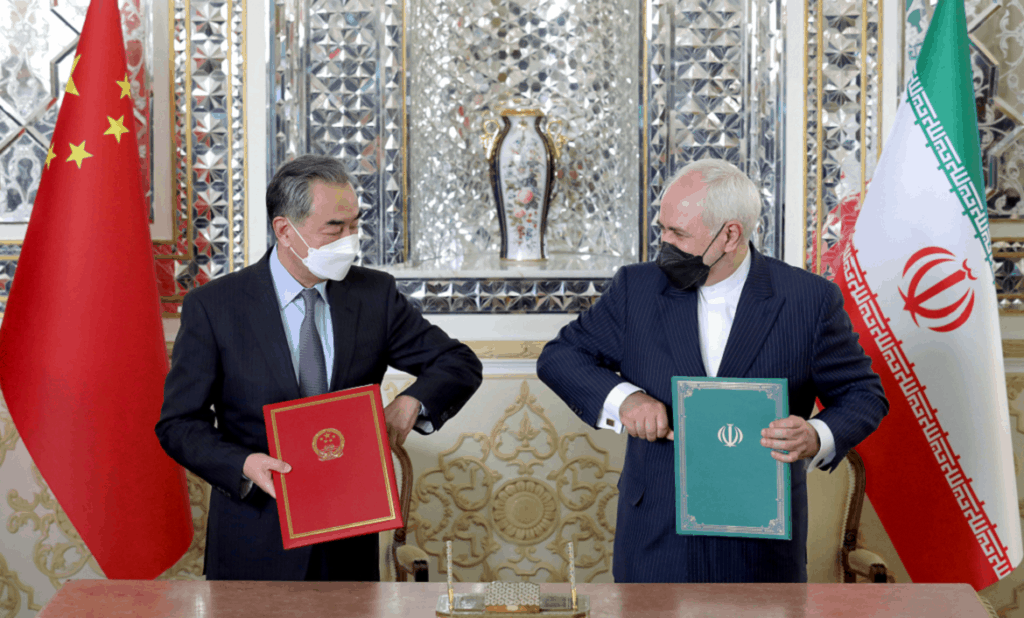By Ali Abbas
The China-Iran deal is a major step forward in Middle East politics. The 25-year Cooperation Program, or Comprehensive Strategic Partnership, is a 25-year cooperation agreement for the further development of Iran-China relations, signed in Tehran by the Chinese and Iranian foreign ministers on 27 March 2021.

Unilateral US sanctions have shaken the Iranian economy, in this scenario Iran needs support from any global giant, global power to sustain its economy and find support in various international forums.
The GCC Arab countries are American allies and also consider Iran as a potential competitor or even a threat to their influence in the region, so in this political situation Iran has been pushed towards the Chinese sphere of influence.To this end, the rising China was the best choice for Iran to reduce and balance Western pressure and support its economic development.
It comes at a specific and difficult strategic moment for Iran and China, as both countries have strategic, diplomatic and economic tensions with the United States. In this difficult and fluctuating economic situation, China’s decision to sign a bilateral agreement is considered a lifeline for the Iranian economy.
The expansion of the Belt and Road Initiative will open new chapters in Middle Eastern politics, as will the upgrading of Iran’s economy and infrastructure.
Certainly Pakistan, as a neighbour, has direct political, security and economic implications from the Iran-China agreement and will seek to benefit from expanding cooperation in its neighbourhood. Pakistan should adapt a trilateral strategic and economic partnership to enhance regional integration and cooperation and counter Indian hegemony in the South Asian region. The China-Iran agreement will help Pakistan meet its energy needs through the Pakistan-Iran gas pipeline and will also create the conditions for joint border management between the two countries.
For Pakistan, India’s presence at the Iranian port of Chabahr is considered a threat to its security.This agreement will also create problems due to Indian investments, although so far most of the promising investment plans have not yet materialised. Pakistan now has an opportunity to assert its strategic and economic interests in a win-win approach. Pakistan’s Gwadar port, already part of the China-Pakistan Economic Corridor under the umbrella of the Belt & Road Initiative, can be declared as a sister port with Iran’s Chabahr. China can develop both ports as trade and economic centres, which will undermine Indian hegemonic designs in the region. The agreement has provided an opportunity for China to strengthen its footholds in the region and can also provide a way for economic and political cooperation between Iran and the GCC countries.
Although, there is no clear information about the modalities of this agreement, it is still confidential not public. But the available information, analysis of experts and policy scholars said that the agreement includes many components other than economic cooperation. The leaked document of the China-Iran partnership said the roughly $400 billion deal that includes economic, energy and military cooperation also includes joint research and intelligence sharing.
Strategically, there is a natural partnership between Pakistan and China based on their shared and common hostile relations with the US and interested in collaborating in various areas like energy, telecommunications and infrastructure development. Pakistan can provide China with route and sea access to expand BRI economic cooperation. At the same time Pakistan can turn China Iran deal in its favour and create opportunities to bridge its relationship with Iran.
Although Pakistan will face challenges from its Gulf allies and perhaps the United States, the country’s national interest, economic prosperity must be the priority. Pakistan must push the China-Pakistan Economic Corridor with the aim of expanding and facilitating economic cooperation and trade relations between China, Pakistan, Iran and Turkey in a win-win approach, while bearing in mind that instability in Afghanistan may negatively affect the agreement or disrupt economic integration in the region.
Author: Ali Abbas – PhD Scholar at the School of Politics and International Studies, Central China Normal University Wuhan. He holds M.Phil. Degree in International Relations from National Defence University Islamabad, Pakistan. His Ph.D. research focuses on the Strategic triangular relationship between Pakistan-China and the USA in the 21st century. His research area of interest further includes South Asian studies, Extremism, and terrorism, foreign policy of great powers. He writes in China Daily, Modern Diplomacy, Eurasia Review, South Asian Journal and Always CCNU Magazine. Currently he is working as Editor of “Always CCNU” Magazine.
(The views expressed in this article belong only to the author and do not necessarily reflect the editorial policy or views of World Geostrategic Insights).
Image Credit: AP
Related Posts
Afghanistan-China-Pakistan Fourth Trilateral Dialogue
Pakistan-US Relations Under Biden: A Future Perspective
Pakistan: A Foreign Policy Perspective
Benefits and risks for Iran of the outcome of the 44-day war in Karabakh
The impact on the Gulf countries of the exacerbation of US-Iranian tension







